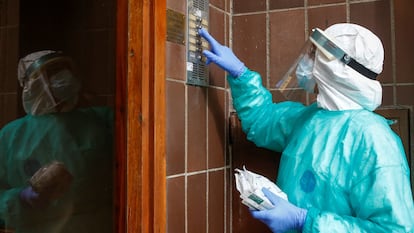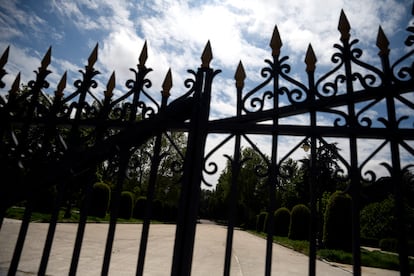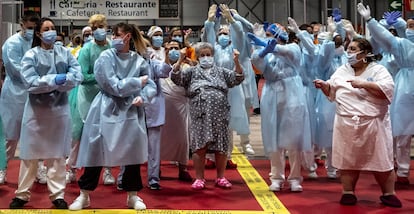Daily coronavirus deaths in Spain remain below 300 for second day running
The outbreak continues to slow, with 281 fatalities reported on Friday, bringing the total since the beginning of the pandemic to 24,824

The number of daily coronavirus deaths registered in Spain was 281 on Friday, according to the latest figures provided by the Health Ministry. This is the second consecutive day that Spain has reported fewer than 300 daily fatalities, but a slight rise from Thursday, when the number of overnight fatalities was 268.
The official death toll in Spain since the beginning of the pandemic now stands at 24,824.
On Friday, there were 1,175 new infections, compared to 1,309 on Thursday. The number of new infections only represents coronavirus cases that have been confirmed via PCR tests, which identify people with an active infection at the time of testing.
Since Sunday, the government has only reported infections confirmed via PCR testing, and not serological tests, which measure antibodies in the blood – i.e. detecting those who have had the coronavirus and recovered. Up until two weeks ago, new cases were only being measured with PCR tests. The total number of infections confirmed via PCR tests is 215,216.
There is, however, a discrepancy in the figures. The number of new cases is actually 1,781, but the Health Ministry has only counted 1,175. This is due to an adjustment with the figures reported by Madrid regional authorities, which included on Friday cases that had been confirmed “with several weeks of delays.”
Health authorities also reported that a total of 114,678 patients have recovered from the Covid-19 disease and have been discharged from hospital, a daily rise of 2,628. The fatality figures in Spain have remained stable over the last week with 325 on Wednesday, 301 on Tuesday, 331 on Monday, and 288 on Sunday.
Speaking at the government’s daily press conference on Friday, Fernando Simón, the director of the Health Ministry’s Coordination Center for Health Alerts, said the number of daily recoveries was particularly positive.
“A figure that clearly shows the improvement is the situation of new recoveries, an increase of 2.5% compared to the day before,” he said.
The health official also spoke about the ministerial order that will allow adults to go out for a walk or for exercise starting on Saturday. “We have to be sensible and understand our joint responsibility,” he explained. “If a person leaves in the morning to do exercise, I understand that there is no problem if they later go out for a walk with their child. None of [the confinement rules] are made or proposed with the intention of trapping people breaking the rules.”
Madrid parks to remain closed

Starting on Saturday, May 2, adults will be allowed to go out for a walk or for exercise as part of Spain’s deescalation measures. But the mayor of Madrid, José Luis Martínez-Almeida, said on Thursday that parks in the city will remain closed until at least May 9, when the current state of alarm will come to an end. This means that residents in Madrid will not be able to visit parks such as El Retiro, Casa del Campo, Madrid Río and Dehesa de la Villa, according to municipal sources.
Speaking at a press conference, the Popular Party (PP) politician said that he wanted to see the conditions of the next extension of the state of alarm before opening the city’s green areas. “We are taking small steps forward, seeing the end of the tunnel, but we cannot let our guard down,” Martínez-Almeida said on Thursday. “We are going to see what happens from May 9, what situation the deescalation is in, in order to make a decision on parks.”
Madrid authorities have expressed concern that opening parks this weekend could lead to large crowds. The leftist opposition group Más Madrid, however, has argued for parks to be opened to allow children and adults to have more space when they go outside.
Spanish economy forecast to shed 9.2%

The Spanish economy is expected to shrink by 9.2% in 2020 as a result of the coronavirus crisis, according to the government’s 2020-2022 Stability Plan, which was sent to the European Union on Friday. This is worse than the 8% fall in Gross Domestic Product (GDP) estimated by the International Monetary Fund (IMF), but better than the 13% calculated by the Bank of Spain, in the worst-case scenario.
Speaking to the press on Friday, Economy Minister Nadia Calviño said that the plan forecast “a very intense fall in economic activity in the second quarter followed by a gradual recovery in the second half of the year and a strong growth rate in 2021.” But she added: “Our forecasts are prudent, given that we are making forecasts in a context of great uncertainty.”
According to estimates in the Stability Plan, the medical sector of the Spanish economy will represent 10.3% of public debt of GDP this year, public debt will reach 115% of GDP, and the unemployment rate will hit 19% in 2020 before falling to 17.2% next year. During the Great Recession, unemployment in Spain was more than 26%.
Spain’s confinement measures, introduced on March 14 in a bid to slow the coronavirus outbreak, have led to a serious downturn in economic activity. On Thursday, the National Statistics Institute (INE) reported that Spain’s GDP fell 5.2% in the first quarter of 2020 – the largest quarterly drop in nearly a century.
Ifema field hospital closes

The temporary field hospital at Madrid’s Ifema convention center closed on Friday after treating 4,000 coronavirus patients. The center – the largest field hospital in Spain – was opened on March 21 at the height of the crisis in a bid to reduce the pressure on the region’s major hospitals. The hospital was closed with a solemn act in tribute to Spain’s health workers.
Traffic authority increase security
Spain’s DGT traffic authority announced on Friday that it will strengthen highway checkpoints ahead of the May long weekend. The extra control is aimed at ensuring Spaniards do not attempt to travel to their second residences during the holiday break.
English version by Melissa Kitson.
Tu suscripción se está usando en otro dispositivo
¿Quieres añadir otro usuario a tu suscripción?
Si continúas leyendo en este dispositivo, no se podrá leer en el otro.
FlechaTu suscripción se está usando en otro dispositivo y solo puedes acceder a EL PAÍS desde un dispositivo a la vez.
Si quieres compartir tu cuenta, cambia tu suscripción a la modalidad Premium, así podrás añadir otro usuario. Cada uno accederá con su propia cuenta de email, lo que os permitirá personalizar vuestra experiencia en EL PAÍS.
¿Tienes una suscripción de empresa? Accede aquí para contratar más cuentas.
En el caso de no saber quién está usando tu cuenta, te recomendamos cambiar tu contraseña aquí.
Si decides continuar compartiendo tu cuenta, este mensaje se mostrará en tu dispositivo y en el de la otra persona que está usando tu cuenta de forma indefinida, afectando a tu experiencia de lectura. Puedes consultar aquí los términos y condiciones de la suscripción digital.









































